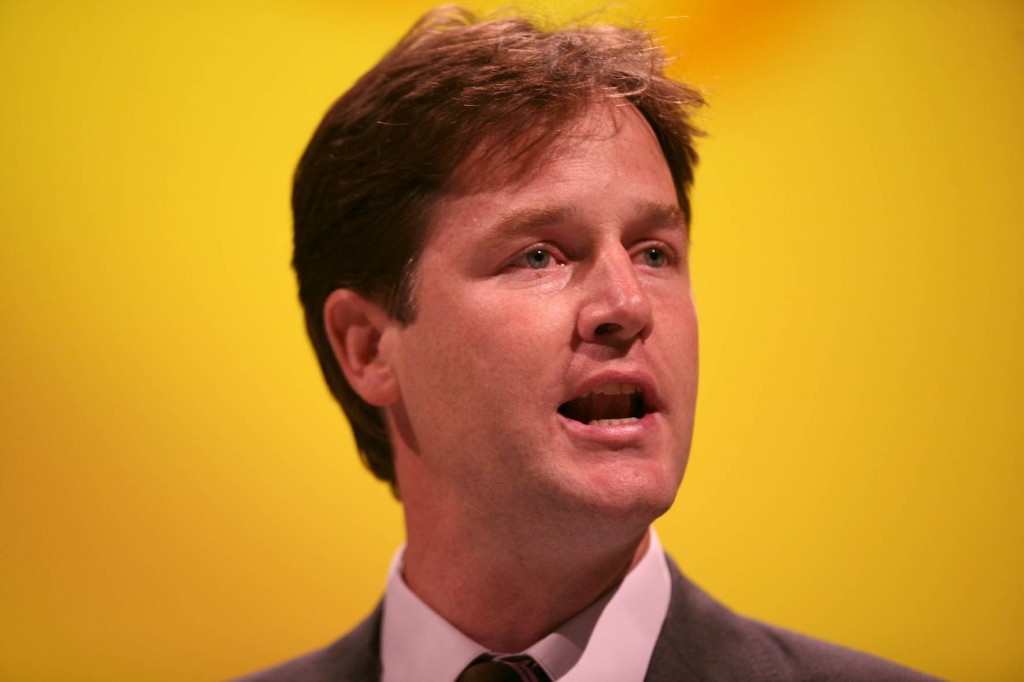 (Reuters) – Deputy Prime Minister Nick Clegg will take the unusual step of holding a news conference on Wednesday to say the country’s two-party coalition will hold together until 2015 as he tries to stabilise a government beset by infighting and rifts.
(Reuters) – Deputy Prime Minister Nick Clegg will take the unusual step of holding a news conference on Wednesday to say the country’s two-party coalition will hold together until 2015 as he tries to stabilise a government beset by infighting and rifts.
In a demarche that risks being cast as a sign of weakness by political opponents, Nick Clegg, the leader of the Lib Dems, will try to reassure voters that his alliance with Prime Minister David Cameron will endure until the next national election.
“I am absolutely committed to this Coalition lasting until 2015 – as is the Prime Minister,” Clegg will tell reporters in a speech, excerpts of which were released to the media beforehand.
“To those voices who say that it will be in either, or both, parties’ interests to prematurely pull the plug: I couldn’t disagree more.”
One senior Lib Dem source said Clegg’s move was an attempt to “calm the horses” after local media reports quoted unnamed aides in Cameron’s Conservative Party![]() as saying they had drawn up contingency plans for a possible coalition breakdown.
as saying they had drawn up contingency plans for a possible coalition breakdown.
“Weeks of turmoil” in the Conservative party had created an impression of instability within the coalition, the same source said, referring to high-profile intra-Conservative rifts on gay marriage and on Britain’s European Union membership.
More than 40 percent of Cameron’s 303 lawmakers voted against his flagship same sex marriage bill on Tuesday evening, underlining how divided his party is on that and other issues.
Cameron has ruled with the Lib Dems since 2010, but the two have taken increasingly different positions on issues such as Britain’s role in Europe and on reform of Britain’s unelected upper house of parliament.
On Sunday, Cameron raised the possibility for the first time that the coalition might not last the course, though he said he wanted it to hold together.
“But if that wasn’t the case then we’d have to face the new circumstances in whatever way we should,” he told Britain’s Total Politics magazine.
DISENCHANTMENT
Some analysts believe the Lib Dems might be tempted to leave Cameron ruling alone at the head of a minority government nearer the next election to try to differentiate themselves in voters’ minds from the Conservatives.
Many traditional supporters of the Lib Dems, a centre-left party, felt alienated when Clegg struck a coalition deal with the Conservatives, a centre-right party, and have been further disenchanted by what they see as the coalition’s “lurch to the right” on immigration and welfare policy.
That disappointment is reflected in opinion polls. Support for the Lib Dems has fallen to less than 10 percent, a rating that means they would be hammered if an election was held today.
Cameron’s Conservatives are also in no hurry to test public opinion. They trail the opposition Labour party by up to 10 percentage points in the polls and are under pressure from the increasingly popular anti-EU UK Independence Party.
However, many of Cameron’s own lawmakers are growing weary of governing with the Lib Dems.
One of them, David Burrowes, told Reuters: “I think it will hold together but there are clearer and clearer dividing lines. Putting it in marriage terms, it’s not irreconcilably broken but we would be pleased to divorce them as soon as possible.”
Clegg, whose leadership of his own party, like Cameron’s, is under constant pressure, will play down such a prospect.
“In 2010 the British people dealt us this hand. And they will not forgive either party if we call time ahead of the election that has been legislated for in 2015 – destabilising the nation in the vague hope of short-term political gain,” he will say.








